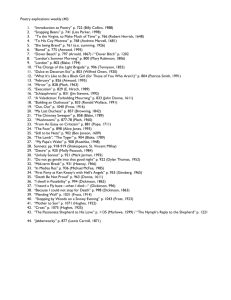
Forming from her own self destruction, Sylvia Plath gathers all of her strength and goes through a metamorphosis unlike any other. Sylvia Plaths Lady Lazarus speaks of Plaths failed suicide attempts and the concept of death. Starting with her herself, Plath controls what she wants others to see, but also she morphs peoples’ judgmental perceptions into an untamable, fictional bird. No longer does Sylvia Plath see herself as a young woman with a tormented soul, but rather she is a magical beast who has power over everything and anyone. Each inquisition about her life causes her to burn a little more inside, but once all is said and done, Plath uses this ashy destruction to reach a new level of existence. Sylvia Plath (1932-1963) But the very second tercet introduces Plath’s concern. Then she goes on to describe the situation, focusing especially on her body first. Sylvia Plath had made another attempt at suicide, after ten years of a previous one. This assumption is right, when we look into Plath’s life, and are able to relate to the events and situation referred to in the poem. The poem begins on the real plane: 'I have done it again'. Hence the speaker of the poem was assumed to be her in the beginning. In these notes, we will focus on the summary, composition, characters and speaker, language and style, rhythm and rhyme, imagery and metaphors, theme and message.

Word Count: 698 Lady Lazarus is an extraordinarily bitter dramatic monologue in twenty-eight tercets. Towards the end of “Lady Lazarus,” Sylvia Plath emphasizes her strengths over weaknesses. She means that all the traditions, including social, political, cultural and literary have tortured and destroyed the female identity but now a new woman is. Plath’s poems are usually written on a confessional note. Lady Lazarus We will show you examples of elements in the text that will be relevant for your analysis. Last Updated on May 5, 2015, by eNotes Editorial. Plath then proceeds with her self-description as a fiery beast which “ men like air” just as those who wronged her (84). Instead of being a weak, interesting woman, Plath becomes this force to be reckoned with. Not necessarily human, but in fact she transcends to a new form. “ Out of the ash” Sylvia Plath regains her strength and becomes a new creature (82). Even with her picturing herself as an exhausted pile of burnt ash, she transforms into a mythical Phoenix. It really makes me wonder how sane was she Would her work be as powerful without the utter disappointment and despair she felt Lady Lazarus the title itself. …show more content… With all of the pain and suffering that she endures, Plath perseveres.

Dark thoughts circulate Plath’s mind constantly, and she describes this in “ Lady Lazarus.” Plath takes the reader through a short journey in her head, where she begins with a recollection of her childhood, up through her present state of torment. Through personal accounts of loss and devastation, Plath paints a lugubrious picture of her overall state of despair and emptiness. Sylvia Plath’s poetry is no different she incorporates her struggles with depression and suicidal tendencies in “Lady Lazarus.” Although this poem address melancholia in a beautiful pattern, “Lady Lazarus” acts as a peephole into the darkest realms of Plath’s existence. Show More Poetry stems from a place deep down in the soul, and frequently this comes from a saddened core.


 0 kommentar(er)
0 kommentar(er)
